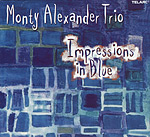
Jamaica's Alexander continues American paean
|
This review first appeared in the Summer 2003 issue of Turbula.
Monty Alexander seems to be growing more prolific the older he gets; in just the last few years, the stellar pianist has explored tributes to Bob Marley and the United States, recorded a live album with a circle of Jamaican musicians, and turned in an album with reggae masters Sly and Robbie.
His most recent release, "Impressions in Blue," is a thematic and stylistic continuation of both the two reggae explorations and last year's "My America."
While that disc percolated with everything from James Brown and Al Green to cowboy songs like "Don't Fence Me In," the second cut was a tribute to Nat "King" Cole (featuring a stellar vocal by Nat's still-living kid brother, Freddy (also a regular on the Telarc label). "Straighten Up and Fly Right" was so lovely, so very alive, that you just knew Alexander would return to the Cole canon. And on "Impressions" he lays out three songs by Cole, whose own upbeat yet technically difficult piano has clearly been an inspiration throughout Alexander's career.
On those three tracks – which are presented consecutively, under a heading of "King Cole Reflections" – Alexander's trio is joined by guitarist John Pizzarelli, which gives the band the feel of the old King Cole trios of the 1940s and '50s that featured Oscar Moore on guitar.
Elsewhere, continuing his paean to the United States, he tackles Gerswhin's "Rhapsody in Blue" (although it sounds a bit too much like the airline commercial version," a couple of songs from the Ellington book, a three-cut visit to the Caribbean, and, following the Cole tribute, another cowboy song.
Nearly as amazing as the pure joy in Alexander's playing (and the joy he inspires in the playing of his fellow musicians) is how much Alexander is able to meld his own style to whatever song is at hand. He has a rather rare ability to both preserve a song's essence of familiarity and turn it to his own strengths.
The result is that when Monty Alexander plays a song, it is at the same time an old favorite and very much his own.
And that's very, very good.
